#lincolnshire family
Text
instagram
Here are 𝟭𝟬 Easter Activities to do with the family!
𝟭. 𝗘𝗮𝘀𝘁𝗲𝗿 𝗲𝗴𝗴 𝗵𝘂𝗻𝘁/𝘀𝗰𝗮𝘃𝗲𝗻𝗴𝗲𝗿 𝗵𝘂𝗻𝘁
Plan an easter egg hunt for your little ones. My children love searching for clues & chocolate eggs around the house or if it's dry, doing it outside in the garden.
𝟮. 𝗣𝗹𝗮𝗻𝘁 𝗳𝗹𝗼𝘄𝗲𝗿𝘀/𝘀𝗲𝗲𝗱𝘀
Growing food, such as planting seeds teaches children about nature, nutrition, responsibility for caring for something, and about where their food originated. It could even help picky eaters develop more of an interest.
𝟯. 𝗘𝗴𝗴 𝗱𝗲𝗰𝗼𝗿𝗮𝘁𝗶𝗻𝗴
Make hard boiled eggs and paint or colour them with pens. A great tradition in most households & there are lots of tutorials online for how to decorate them up!
𝟰. 𝗘𝗮𝘀𝘁𝗲𝗿 𝗧𝗿𝗲𝗲
The tradition in Germany to decorate the branches of trees and bushes with eggs for Easter. The egg is an ancient symbol of life all over the world. Eggs are hung on branches of outdoor trees and bushes and on cut branches inside
𝟱. 𝗘𝗮𝘀𝘁𝗲𝗿 𝗖𝗿𝗮𝗳𝘁𝘀
You can buy pre-made items like sticker books, scratch art, Bird Houses, pottery, masks etc or you can look online and print out alsorts of items from hats to colouring sheets
𝟲. 𝗕𝗮𝗸𝗲!
Get your culinary head on and bake up a storm. There are lots of Easter based recipes out there for you to try. It can be as simple, messy and fun as you want it to b
𝟳. '𝗘𝗴𝗴' 𝘁𝗼𝘀𝘀𝗶𝗻𝗴
Fill up some water balloons and play a game of 'egg' toss. The aim is to keep the balloons in one piece as you throw them from person to person. If you're feeling really brave, use real eggs!
𝟴. 𝗘𝗴𝗴 𝗮𝗻𝗱 𝘀𝗽𝗼𝗼𝗻 𝗿𝗮𝗰𝗲𝘀
Put the decorated boiled eggs to good use and have yourselves a good old fashioned sports day - inspired fun in the garden with a family egg and spoon race.
𝟵. 𝗣𝗶𝗰𝗻𝗶𝗰
This one is always weather permitting in Scotland - but sunshine always seems to fall on the bank holiday weekend. You could meet up with another family and plan a picnic in the park with the kids.
𝟭𝟬. 𝗠𝗮𝗸𝗲 𝗮𝗻 𝗘𝗮𝘀𝘁𝗲𝗿 𝘄𝗿𝗲𝗮𝘁𝗵
An Easter wreath is the best decoration for a front door, hallway, or as a spring table centrepiece - always give a Spring aesthetic
#easter aesthetic#easter theme#easter wreath#yourblendedfamily#easter crafts#easter tree#bryonyperfectlyimperfect#Lincolnshire family#toddler play ideas#motherhood bliss#play at home today#home of littles#adventurous families#invite to play#parent blogger#easter decor#easter activities#easter time#treasure the moments#easter activities to do#entertaining the kids#create make and play#spring is here#easter#egg hunting#crafts#fun#parenting#play at home#childs play
3 notes
·
View notes
Text
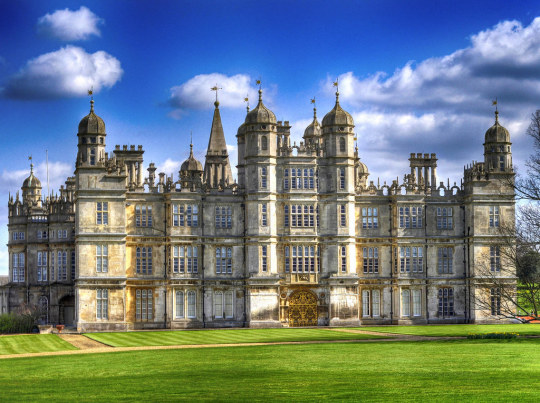
Burghley House was built in the shape of an 'E' to honour Queen Elizabeth I. It lies on the border of Lincolnshire and Cambridgeshire.
#Burghley House#Stamford#Lincolnshire#Cambridgeshire#UK#Lord Cecil#Cecil family#Elizabethan era#baroque#Elizabethan architecture#Peterborough#English mansions
212 notes
·
View notes
Text
Found out I have some distant ancestor or another from the irl Bag End, but not the famous one apparently- the one in East Lindsey- a district where all my the ancestors of grandpa's grandma swapped genes across tiny hamlets ending in '-by' for millennia
#finally escaped america in the great learn-about-the-past-quest#talk to me about the lincolnshire to 'head out with some religious extremists' pipeline cause i have two lines of family doing that#in wildly different centuries i s2g#but upon looking at maps of the area#i have reason to believe both were cases of 'im gonna get out of this podunk town' -itis
0 notes
Text
The Mirror:
Only working royals allowed on balcony for King Charles' Coronation - line-up in full
The King and Queen will celebrate their coronation by appearing on the Buckingham Palace balcony with just the working royals, it can be revealed.
Detailed plans seen by The Mirror reveal how the King has chosen to say thanks for the nation alongside a select few royals who have dedicated their lives to public service, while also showing "the heartbeat and future of his family".
Charles and Camilla will travel from Westminster Abbey in the Gold State coach back to Buckingham Palace, joined in procession with the chosen group.
Future king and queen, the Prince and Princess of Wales, will appear with their three children - Prince George, nine; Princess Charlotte, seven and Prince Louis, four.
Charles's trusted lieutenant and beloved sister, Princess Anne, will be by the King's side with her husband Vice Admiral Sir Tim Laurence.
The new Duke and Duchess of Edinburgh, Prince Edward and his wife Sophie, who spent so much time with the late Queen in the final years of her life, will also be present.
A source with knowledge of the plans said: "The King has been very clear who he wants to represent the monarchy.
"There is little room for sentiment, this is a State occasion, not a family occasion and it is right that only the working members of the family are there at the big public moment."
The King also insisted on some of his mother's most trusted and loyal servants and family members to be included, despite their days as working royals being numbered.
The Duke of Kent, 87, a working royal and first cousin of both the late Queen and Prince Philip, will also attend alongside his sister Princess Alexandra, 86.
Our source said their attendance on the balcony would be confirmed on the day owing to "individual health problems".
The Duke and Duchess of Gloucester have also been asked by the King to join him and Camilla.
Our source added: "The balcony moment will be the King's final presentation of a slimmed down monarchy, which of course will be even further slimmed down once the Gloucesters, Duke of Kent and Princess Alexandra finally step away from public life and into their well earned retirements.
"It is a final thank you for them and a nod to their support of his mother during her 70 year reign."
A stunning fly past is also planned for the big moment, with Lincolnshire's famous Red Arrows aerial aerobatics team soaring above Buckingham Palace, as the royals gaze towards the sky.
195 notes
·
View notes
Text
The Ministry of Defence announced The Prince of Wales, who qualified as an RAF search and rescue pilot, has become the Royal Honorary Air Commodore at RAF Valley in Wales.
The Princess of Wales has adopted the position of Royal Honorary Air Commodore at RAF Coningsby, a title previously held by her husband, who had performed the role at the Lincolnshire base for 15 years from 2008.
She has also become the Commodore-in-Chief of the Fleet Air Arm and Colonel-in-Chief of the Queen's Dragoon Guards.
Buckingham Palace said: 'The King is pleased to announce further military appointments for working members of the Royal Family.
'The new appointments will continue to reflect the close relationship between the Armed Forces and the Royal Family.'
134 notes
·
View notes
Text
Do you ever think about the way that both Mori learnt Lincolnshire-accented English from Thaniel and Raphael learnt Cornish-accented English from Harry and so Merrick and Thaniel share the experience of being far from home and unexpectedly finding someone who sounds like family?
45 notes
·
View notes
Text
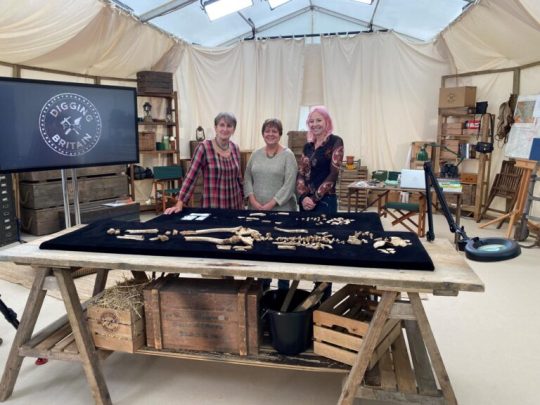
1,500-year-Old Anglo-Saxon Cemetery Found in UK
One of the most notable discoveries was the burial of a teenage girl and child.
Archaeologists in the United Kingdom have announced a major historical discovery dating back to as early as the 6th century after finding the buried remains of over 20 people alongside a range of grave goods including knives, jewelery and pottery vessels, officials said.
Scientists working on the National Grid’s Viking Link project -- construction of the world’s longest land and subsea interconnector involving installation of submarine and underground cables between the United Kingdom and Denmark -- have dug 50 archaeological sites along the onshore cable route since 2020, according to a statement from Wessex Archaeology in the United Kingdom.
“The wealth of evidence recovered is shedding light on life across rural south-east Lincolnshire from prehistory to the present day, with highlights including a Bronze Age barrow and a Romano-British farmstead. The most striking discovery, however, is the remains of an Anglo-Saxon cemetery,” according to Wessex Archaeology.
“The burials in the cemetery deliberately focus on an earlier Bronze Age ring ditch and indicate the funerary landscape was long established,” scientists said. “Archaeologists uncovered the buried remains of over 20 people alongside a range of grave goods including knives, jewellery and pottery vessels. From these 250 artefacts, experts know the cemetery dates to the 6th and 7th centuries AD.”
Among some of the most notable discovery was the burial of a teenage girl and a child, both of whom lay on their sides with the child tucked in behind the older girl, officials said.
“Two small gold pendants set with garnets and a delicate silver pendant with an amber mount were recovered from around the teenager’s head or chest, together with two small blue glass beads and an annular brooch,” according to Wessex Archaeology.
The relationship between the child and the teenager is not yet known -- and may never be -- but scientists are now conducting research and analysis on the subjects, including isotope and Ancient DNA analysis of the skeletal remains.
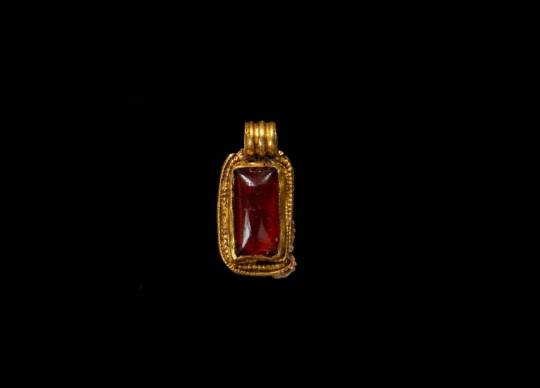
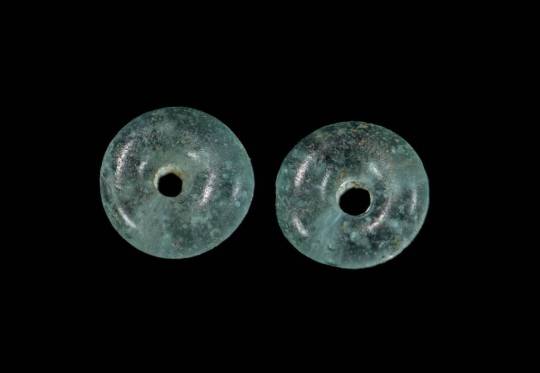
Officials say that this critical research could help to identify “familial relationships and broader genetic links both within this community and between others in the region, and the movement of people in wider society.”
“I really enjoyed being part of the project. It was surprising how many artefacts we found across the route - the gold Anglo-Saxon pendant from the burial ground was a highlight as was the outreach with the local communities to share what we found,” said Peter Bryant who led the project for Viking Link. “It has been very interesting and exciting to help unearth the hidden treasures that have lain dormant for hundreds of years, in such a careful way.”
Specialists will also be looking at the artefacts discovered on the burial site as well as the layout of the cemetery in hopes of learning more about the economic, cultural and social factors affecting this specific community, “including the import of exotic goods and the health of those buried within different parts of the cemetery,” according to Wessex Archaeology.
“Although many Anglo-Saxon cemeteries are known in Lincolnshire, most were excavated decades ago when the focus was on the grave goods, not the people buried there,” said Jacqueline McKinley, principal osteoarchaeologist of Wessex Archaeology. “Excitingly, here we can employ various scientific advancements, including isotopic and DNA analyses. This will give us a far better understanding of the population, from their mobility to their genetic background and even their diet.”
Said Wessex Archaeology following the discovery: “As this research unfolds, we hope to greatly extend our understanding of Anglo-Saxon life and death in the region."
By Jon Haworth.
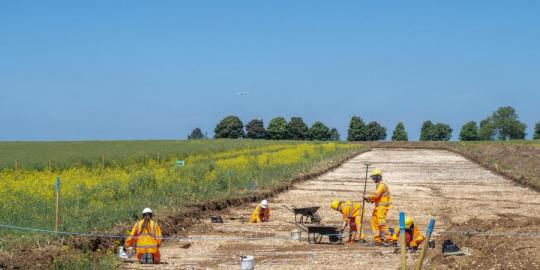
#1500-Year-Old Anglo-Saxon Cemetery Found in UK#ancient graves#ancient tombs#ancient artifacts#archeology#archeolgst#history#history news#ancient history#ancient culture#ancient civilizations#ancient jewelry
40 notes
·
View notes
Text
Highway to Pail Day 4
[Day 1] [Prev] [Next]
@do-it-with-style-events
February 4: I don't trust trees. They're shady.
Pestilence was making her way through the countryside again, and it rather dampened Crowley's mood. The bloody blasted plague was sweeping through England, making it difficult and depressing to travel even for a demon who wasn't able to contract human diseases, since nobody but him knew that and revealing otherwise was likely to get him discorporated. There was also the matter of the damned (literally) horse, a great hulking black stallion that despised Crowley and was despised in return. Blackie had tried to throw Crowley twice in the last hour, and had only failed because Crowley had miracled himself to the saddle.
He had to go tempt someone in Hull, of all the godforsaken places. Surely just living in Hull was punishment enough; no need to bring eternity into it.
Since he was heading north anyway, he figured he might try to make it over to see how Manchester was coming along this decade, and since that made an extended trip, he checked to see if Aziraphale needed him to pick up anything while he was out.
"Ah, a new set of orders just arrived for me this morning!" Aziraphale had said, bustling over to his desk. "Well, let's see. I've a spot of divine ecstasy to deliver in Hull from the last set; I've been putting it off but you know the poor lady must deserve it: living in Hull is trial enough for the soul. Hmm, Plymouth--ah, American Plymouth rather--, Swansea, Geneva... oh, here, there's one in Lincolnshire as well, you'll like this one, dear. 'Divine inspiration to more accurate human understanding of the underlying laws of the universe," that's much more your area than mine I should think, natural sciences and all that."
It was indeed much more Crowley's area; he liked hanging out with scientists and philosophers, the kind of humans who asked clever questions about how the universe worked and why. Aziraphale always gave him the good divine inspirations, cloaking it in ignorance of the physical laws that had always been second-nature to Crowley, though Crowley knew Aziraphale had enough understanding to carry them out himself. It was one of the reasons the Arrangement worked so well, he thought; they did each other little favors like this, gave each other jobs that were a bit fun.
And so here Crowley was, fighting with a horrible horse in the middle of nowhere during a plague year looking for a sheep farm. This part was not fun. This part, to be very clear, totally sucked.
Thankfully, Aziraphale had already interpreted Heaven's shaky-at-best approximations at where things on Earth were actually located, and given Crowley an address and a decent map of the area, so he located the sheep farm -- Woolsthorpe Manor, the map said -- with little difficulty aside from Blackie's enmity and a general sense of unease and malaise in the air.
He dismounted, setting Blackie to graze and to behave himself under threat of being sold for meat and glue, and took a moment to case the place. Sheep and pastures; biggish house and a bunch of sheds; orchard with some fruit trees. Aziraphale's orders hadn't been very specific about how the intervention should be achieved, but there'd been some balderdash about natural beauty and the circular nature of God's Plan For Life On Earth, and Crowley noticed an apple tree on the edge of the orchard, near to a window; he bookmarked that thought.
The target was called "Yitzhak the Lizard" in Aziraphale's orders, so he and Crowley supposed he was most likely called Isaac, but the family living at Woolsthorpe Manor was called Ayscough. Crowley suspected it would take a bit of detective work to figure out which servant Isaac was, and was still deciding how to approach when a young man in his mid-twenties jumpscared him.
Introduced himself as Isaac Newton, too, so that solved that.
Using just a touch of a glamour to make his presence seem a bit more natural and less like a potential vector of disease, Crowley chatted with the young man for a good while. Isaac was the grandson of the widow Ayscough, a student at Trinity College, sent home due to the plague, interested in optics and the laws of motion and, more than anything else in the world, mathematics. He showed Crowley his notebook full of notations, letters with little dots over them equaling other letters, which Crowley couldn't follow, and explained the logic of it, which Crowley could. Heaven, he thought, had wanted Aziraphale to arrange a divine intervention into Isaac's mathematics, but Isaac had that well in hand already: it was well beyond what anyone else on Earth had thought up, and he was still a student.
As evening drew in, young Isaac invited Crowley to supper and shelter for the night, which he accepted politely, and to board Blackie in the stables, which he accepted with vicious glee. Making Blackie someone else's problem for a bit always put a little varnish on their souls while also relieving him of needing to lift a finger or deal with the damn horse.
As they passed through the orchard, Isaac ran his hand through the leaves of low-lying branches. A gardener yelled across the field not to disturb the apples, to which the young man just smiled.
Well. Crowley knew a thing or two about apples and Plans, and the kid had wondered why things move the way they do.
As they passed under a lovely straight Flower of Kent, Isaac Newton disturbed the leaves and a large, green, perfectly round apple miraculously imbued with insight into the observation that "things fall down" fell out of the tree and smacked into his skull.
As he stopped to rub his head while Crowley tried not to laugh at him, the young man asked: "I wonder how far an apple could fall? Not just from the tree, that is, but why not from as high as the moon?"
Crowley just smiled enigmatically, which Isaac took as encouragement, and mentally began drafting a memo for Aziraphale to send back up to Home Office.
---
Author's note:
Everything's as close to accurate to real life Isaac Newton and Woolsthorpe Manor as I could get it, except his personality (which I understand was curmudgeonly in his old age, but I have no idea about him as a youth) and the fact that he didn't *actually* have an apple fall on his head, probably. 1666 was indeed the year he first started developing both calculus and the law of gravitation.
I'm sorry for picking on Hull! I'm sure it's a lovely city. I chose it as the place Crowley was going for a temptation (and a divine ecstasy) because that's the place specifically called out as an example of the arrangement in the book, and so is Crowley getting free reign over Manchester (page 50 in my paperback). And hey, if he's already going north....
The actual pun didn't quite make it in, but hey! Trees!
#my writing#do it with style events#highway to pail#crowley#crowley good omens#good omens#good omens fanfiction#the arrangement#isaac newton
19 notes
·
View notes
Text



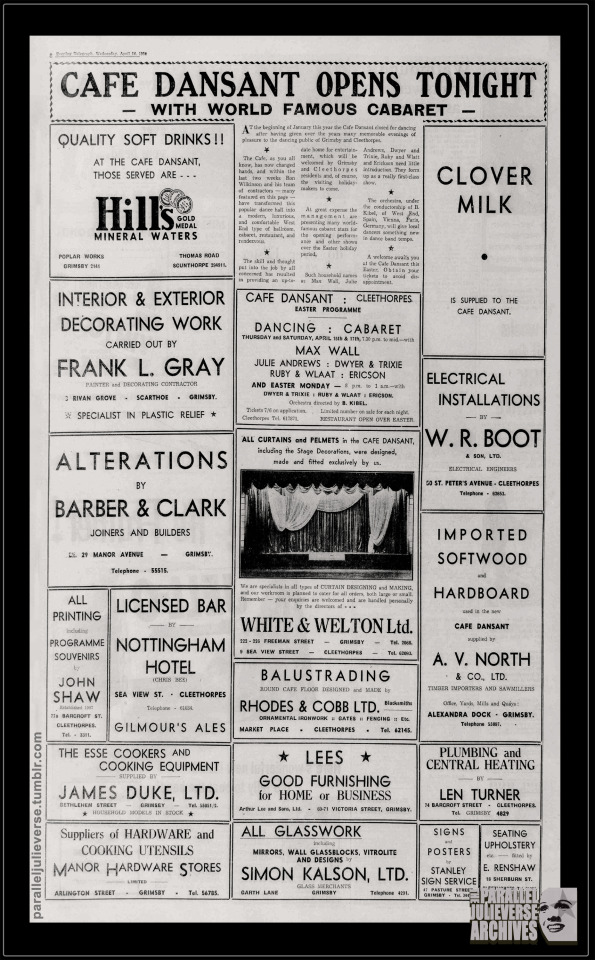
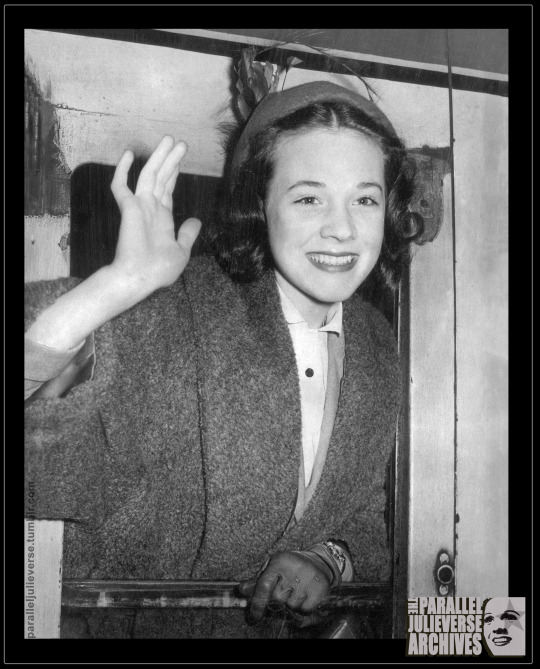
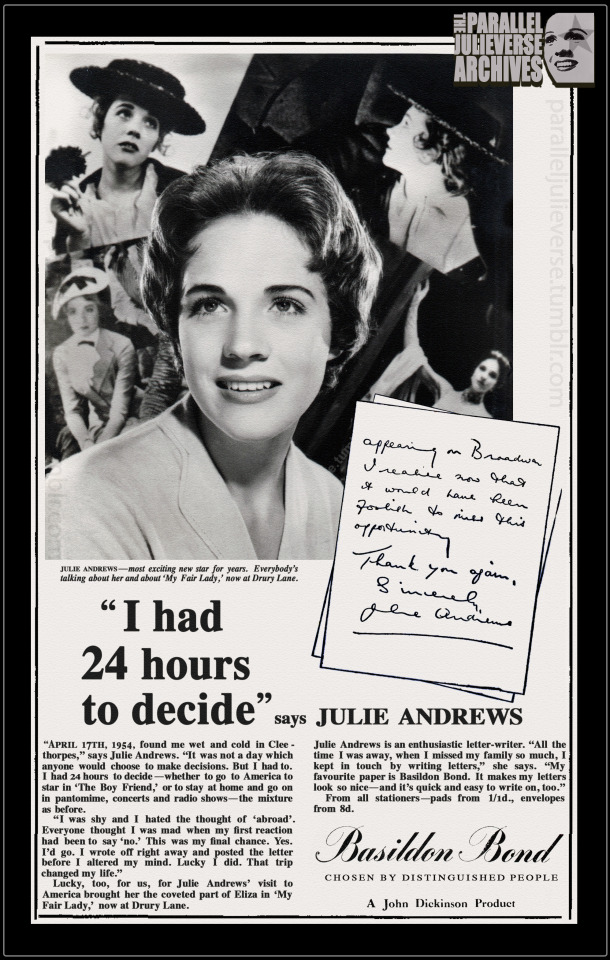
Come taste the wine... : 70th anniversary of Julie Andrews's 'cabaret debut' at the Café Dansant, Cleethorpes,
3 performances
Easter, 14-17 April, 1954
This week, seventy years ago, Julie Andrews made her official 'cabaret debut' at the Café Dansant in Cleethorpes. While not a major milestone in the traditional sense -- and one that seldom features in standard Andrews biographies -- the Cleethorpes appearance was nevertheless a significant event in the star's early career.
For a start, it was Julie's first appearance in cabaret -- the theatrical genre that is, not the Broadway musical which is a whole other Julieverse story. Characterised by sophisticated nightclub settings with adult audiences watching intimate performances, cabaret emerged in fin-de-siècle Paris before expanding to other European cities such as Berlin and Amsterdam (Appignanesi, 2004). Imported to Britain in the interwar years, cabaret offered a more urbane, adult alternative to the domestic traditions of English music hall and variety with their family audiences and jolly communal spirit (Nott, 2002, p. 120ff).
Julie's debut in cabaret was, thus, a significant step in her professional evolution towards a more mature image and repertoire. By 1954, Julie was 18, and well beyond the child star tag of her earlier years. Under the guidance of manager, Charles Tucker, there was a calculated strategy to reshape her stardom towards adulthood.
The maturation of Julie's image had begun in earnest the previous summer with Cap and Belles (1953), a touring revue that Tucker produced as a showcase for Julie, comedian Max Wall, and several other acts under his management. Cap and Belles afforded Julie the opportunity to shine with two big solos and a number of dance sequences. Much was made in show publicity of Julie's new "grown up" look, including the fact that she was wearing "her first off-the-shoulder evening dress" ('Her First Grown-Up Dress', 1953, p. 4).
The Cleethorpes cabaret was a further step in this process of transformative 'adulting'. Indeed, it was something of a Cap and Belles redux. Not only was Max Wall back as headline co-star, Julie even wore the same 'grown up' strapless evening gown. In keeping with a cabaret format, though, Julie was provided a longer solo set where she sang a mix of classical and contemporary pop songs including "My Heart is Singing", "Belle of the Ball", "Always", and "Long Ago and Far Away" ('Cabaret opens', 1954, p. 4).
That Julie should have chosen Cleethorpes for her cabaret debut might seem odd to contemporary readers. Today, this small town on the north Lincolnshire coast is largely regarded as a somewhat faded, out-of-the-way seaside resort. In its heyday of the mid-twentieth century, however, Cleethorpes was a vibrant tourist hub that attracted tens of thousands of holidaymakers each year (Dowling, 2005). With several large theatres and entertainment venues, Cleethorpes was also an important stop in the summertime variety circuit, drawing many of the era’s big stars and entertainment acts (Morton, 1986).
The Café Dansant was one of Cleethorpes' most iconic nighttime venues, celebrated for its elegant suppertime cabarets and salon orchestras. Opening in the 1930s, the Café was a particularly popular haunt during the war and post-war era when servicemen from nearby bases danced the night away with locals and visiting holidaymakers to the sound of touring jazz bands and crooners (Dowling, 2005, p. 129; Ruston, 2019).
By 1954, the Café was starting to show its age, and incoming new management decided to shutter the venue for several months to undertake a luxury refurbishment (‘Café Dansant closed', 1954, p. 3). A gala re-opening was set for the Easter weekend of April 1954, just in time for the start of the high season (‘Café Dansant opens', 1954, p. 8).
Opening festivities for the Café kicked off with a lavish five hour dinner cabaret on the evening of Wednesday, 14 April. Julie was “one of the world famous cabaret stars" booked for the gala event, and she received considerable promotional build-up in both local and national press (‘Café Dansant opens', 1954, p. 8). There was even a widely circulating PR photo of Julie boarding the train to Cleethorpes at London's Kings Cross station.
In the end, Max Wall was unable to appear due to illness, and Alfred Marks -- another Tucker artist and former variety co-star of Julie's (Look In, 1952) -- stepped in at short notice. Rounding out the bill were several other minor acts, including American dance duo, Bobby Dwyer and Trixie; novelty entertainers, Ruby and Charles Wlaat; and magician Ericson who doubled as cabaret emcee.
Commentators judged the evening a resounding success. The "Cafe Dansant has got away to a flying start, after probably the biggest opening night ever seen in Cleethorpes," effused one newspaper report (Sandbox, 1954, p.4). Special mention was made of Julie who “received a great reception when she sang a selection of old and new songs, accompanied at the piano by her mother” (‘'Café Dansant reopening’, 1954, p. 6).
Following her performance, Julie joined the Mayor of Cleethorpes, Mr Albert Winters, in a cake-cutting ceremony and mayoral dance. Decades later, Winters recalled how he still “savour[ed] the memory of snatching a dance with the young girl destined to be a star… [S]he seemed very slim and frail,” he reminisced, “but she was a great dancer and I thoroughly enjoyed myself” (Morton, 1986, p. 15).
Julie stayed on in Cleethorpes for two more performances on Thursday 15 and Saturday 17 April respectively, before returning to London with her mother on Easter Sunday, 18 April. The very next day she commenced formal rehearsals for Mountain Fire, Julie's first dramatic 'straight' play and another step in her professional pivot to more adult content (--also, time permitting, the subject of a possible future blogpost).
A final noteworthy aspect about the Cleethorpes appearance is that it was during this weekend that Julie made the momentous decision to go to America to star in The Boy Friend. In what has become part of theatrical lore, Julie had been offered the plum role of Polly Browne in the show's Broadway production sometime in February or March of 1954 while she was appearing in Cinderella at the London Palladium. To the American producers’ astonishment --- and manager Tucker’s horror -- Julie was initially reluctant to accept, fearful of leaving her home and family. She prevaricated for weeks. Finally, while she was in Cleethorpes, Julie was given an ultimatum and told she had to make her decision.
In her 1958 serialised memoir for Woman magazine, Julie recounts:
“Mummie and I went to Cleethorpes to do a concert. It was a miserable wet day. From our hotel I watched the dark sea pounding the shore with great grey waves. I was called to the downstairs telephone.
“Julie,” said Uncle Charles [Tucker]‘s voice from London, “they can’t wait any longer. You’ll have to make your mind up NOW.”
I burst into tears.
“I’ll go Uncle,” I sobbed, “if you’ll make it only one year’s contract instead of two. Only one year, please.” …
Against everyone’s judgment and wishes I got my way…None of us knew that if I’d signed for two [years], then I should never have been free to do Eliza in My Fair Lady. And never known all the happiness and success it has brought me” (Andrews, 1958, p. 46).
The Cleethorpes ultimatum even found its way into an advertising campaign that Julie did for Basildon Bond stationery in 1958/59, albeit with the telephone call converted into a letter for enhanced marketing purposes. Framed as a choice between going to America and the “trip [that] changed my life” or staying at home in England “and go[ing] on in pantomime, concerts, and radio shows—the mixture as before,” the advert highlighted the “sliding door” gravity of that fateful Cleethorpes weekend (Basildon Bond, 1958). What would the course of Julie's life been like had she said no to Broadway and opted to remain in the UK?
It is a speculative refrain that Julie and others have made frequently over the years. “If I’d stayed in England I would probably have got no further than pantomime leads,” she mused in a 1970 interview (Franks, 1970, p. 32). Or, more dramatically: “Had I remained in London and not appeared in the Broadway production of The Boy Friend…who knows, I might be starving in some chorus line today” (Hirschorn, 1968).
In all seriousness, it's doubtful that a British-based Julie would have faded into professional oblivion. As biographer John Cottrell quips: "that golden voice would always have kept her out of the chorus” (Cottrell, 1968, p. 71). Nevertheless, Julie's professional options in Britain during that era would have been greatly diminished. And she certainly wouldn't have achieved the level of international superstardom enabled by Broadway and Hollywood. Who knows, in a parallel 'sliding door' universe, our Julie might have gone on playing cabarets and end-of-pier shows in Cleethorpes...
Sources
Andrews, J. (1958). 'So much to sing about, part 3.' Woman. 17 May, 15-18, 45-48.
Appignanesi, L. (2004). The cabaret. Revised edn. Yale University Press.
Basildon Bond. (1958). 'I had 24 hours to decide, says Julie Andrews'. [Advertisement]. Daily Mirror. 6 October, p. 4.
'Cabaret opens Café Dansant." (1954). Grimsby Daily Telegraph. 15 April, p. 4.
‘Café Dansant closed.' (1954). Grimsby Evening Telegraph. 28 January, p. 3.
‘Café Dansant opens tonight – with world-famous cabaret’. (1954). Grimsby Evening Telegraph. 14 April, p. 8.
‘Café Dansant reopening a gay affair.’ (1954). Grimsby Evening Telegraph. 15 April, p. 6.
Cottrell, J. (1968). Julie Andrews: The story of a star. Arthur Barker Ltd.
Dowling, A. (2005). Cleethorpes: The creation of a seaside resort. Phillimore.
'Echoes of the past, the old Café Dansant'. (2009). Cleethorpes Chronicle. December 3, p. 13.
Frank, E. (1954). Daily News. 15 April, p.6.
Franks, G. (1970). ��Whatever’s happened to Mary Poppins?’ Leicester Mercury. 4 December, p. 32.
'Her first grown-up dress.' (1953). Sussex Daily News. 28 July, p. 4.
Hirschorn, C. (1968). 'America made me, says Julie Andrews.' Sunday Express. 8 September, p. 23.
Morton, J. (1986). ‘Where the stars began to shine’. Grimsby Evening Telegraph. 22 September, p. 15.
Nott, J.J. (2002). Music for the people: Popular music and dance in interwar Britain. Oxford University Press.
Ruston, A. (2019). 'Taking a step back in time to the Cleethorpes gem Cafe Dansant where The Kinks once played'. Grimsby Live. 12 October.
Sandboy. (1954). 'Cleethorpes notebook: Flying start.' Grimsby Evening Telegraph. 19 April, p. 4.
12 notes
·
View notes
Text
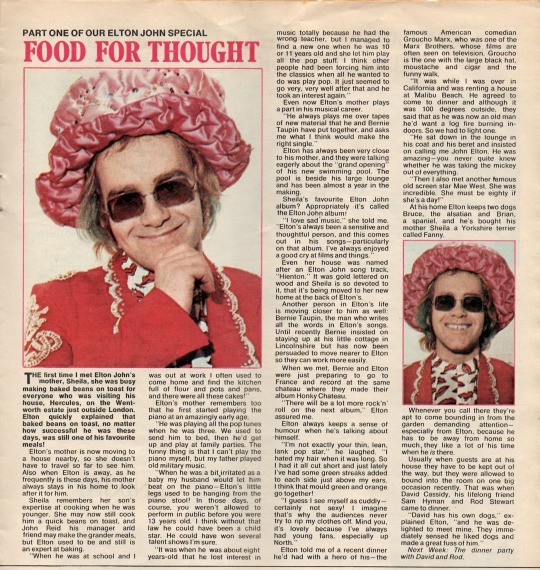
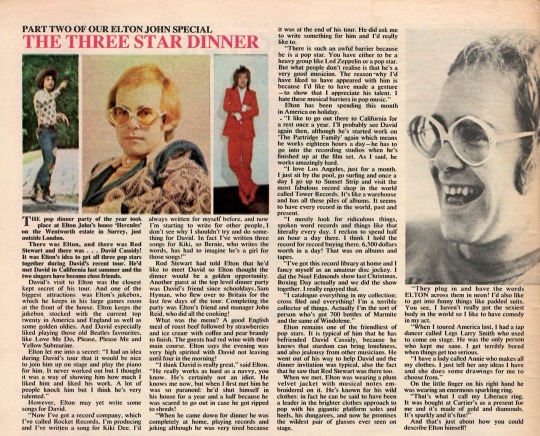
From Jackie issues 497 and 498, published 14th and 21st of July 1973. Transcription under the cut because why not
PART ONE: THE first time I met Elton John's mother, Sheila, she was busy making baked beans on toast for everyone who was visiting his house, Hercules, on the Wentworth estate just outside London.
Elton quickly explained that baked beans on toast, no matter how successful he was these days, was still one of his favourite meals!
Elton's mother is now moving to a house nearby, so she doesn't have to travel so far to see him.
Also when Elton is away, as he frequently is these days, his mother always stays in his home to look after it for him.
Sheila remembers her son's expertise at cooking when he was younger. She may now still cook him a quick beans on toast, and John Reid his manager and friend may make the grander meals, but Elton used to be and still is an expert at baking.
"When he was at school and I was out at work I often used to come home and find the kitchen full of flour and pots and pans, and there were all these cakes!"
Elton's mother remembers too that he first started playing the piano at an amazingly early age.
"He was playing all the pop tunes when he was three. We used to send him to bed, then he'd get up and play at family parties. The funny thing is that I can't play the piano myself, but my father played old military music
"When he was a bit irritated as a baby my husband would let him beat on the piano -Elton's little legs used to be hanging from the piano stool! In those days, of course, you weren't allowed to perform in public before you were 13 years old. I think without that law he could have been a child star. He could have won several talent shows I'm sure.
"It was when he was about eight years-old that he lost interest in music totally because he had the wrong teacher, but I managed to find a new one when he was 10 or 11 years old and she let him play all the pop stuff. I think other people had been forcing him into the classics when all he wanted to do was play pop. It just seemed to go very, very well after that and he took an interest again."
Even now Elton's mother plays a part in his musical career.
He always plays me over tapes of new material that he and Bernie Taupin have put together, and asks me what I think would make the right single."
Elton has alwas been very close to his mother, and they were talking eagerly about the “grand opening” of his new swimming pool. The pool is beside his large lounge and has been almost a year in the making.
Sheila's favourite Elton John album? Appropriately it's called the Elton John album!
"I love sad music," she told me.
"'Elton's alwavs been a sensitive and thoughtful person, and this comes out in his songs-particularly on that album. I've always enjoyed a good cry at films and things.
Even her house was named after an Elton John song track, Hienton." It was gold lettered on wood and Sheila is so devoted to it, that it's being moved to her new home at the back of Elton's.
Another person in Elton's life is moving closer to him as well:
Bernie Taupin, the man who writes all the words in Elton's songs.
Until recently Bernie insisted on staying up at his little cottage in Lincolnshire but has now been persuaded to move nearer to Elton so they can work more easily.
When we met, Bernie and Elton were just preparing to go to France and record at the same chateau where they made their album Honky Chateau.
"There will be a lot more rock'n' roll on the next album." Elton assured me.
Elton always keeps a sense of humour when he's talking about himself.
I’m not exactly your thin. lean, lank pop star," he laughed. hated my hair when it was long. So I had it all cut short and just lately I've had some green streaks added to each side just above my ears.
I think that mould green and orange go together!
"I guess I see myself as cuddly - certainly not sexy! I imagine that's why the audiences never try to rip my clothes off. Mind you, it's lovely because I've always had. young fans, especially up North.”
Elton told me of a recent dinner he'd had with a hero of his--the famous American comedian Groucho Marx, who was one of the Marx Brothers, whose films are often seen on television. Groucho is the one with the large black hat, moustache and cigar and the funny walk.
"It was while I was over in California and was renting a house at Malibu Beach. He agreed to come to dinner and although it was 100 degrees outside, they said that as he was now an old man he'd want a log fire burning in-doors. So we had to light one.
"He sat down in the lounge in his coat and his beret and insisted on calling me John Elton. He was amazing - you never quite knew whether he was taking the mickey out of everything
"Then I also met another famous old screen star Mae West. She was incredible. She must be eighty if she's a day!"
At his home Elton keeps two dogs. Bruce, the alsatian and Brian, a spaniel, and he's bought his mother Sheila a Yorkshire terrier called Fanny.
Whenever you call there they're apt to come bounding in from the garden demanding attention-especially from Elton, because he has to be away from home so much, they like a lot of his time when he is there.
Usually when guests are at his house they have to be kept out of the way, but they were allowed to bound into the room on one big occasion recently. That was when David Cassidy, his lifelong friend Sam Hyman and Rod Stewart came to dinner.
"David has his own dogs," ex-plained Elton, "and he was delighted to meet mine. They immediately sensed he liked dogs and made a great fuss of him.”
Next Week: The dinner party with David and Rod.
PART TWO: THE pop dinner party of the year took place at Elton John's house 'Hercules? on the Wentworth estate in Surrey, just outside London.
There was Elton, and there was Rod Stewart and there was . . . David Cassidy!
It was Elton's idea to get all three pop stars together during David's recent tour. He'd met David in California last summer and the two singers have become close friends.
David's visit to Elton was the closest kept secret of his tour. And one of the biggest attractions was Elton's jukebox, which he keeps in his large games room at the front of the house. Elton keeps the jukebox stocked with the current top twenty in America and England as well as some golden oldies. And David especially liked playing those old Beatles favourites, like Love Me Do. Please, Please Me and Yellow Submarine.
Elton let me into a secret: "I had an idea during David's tour that it would be nice to join him up on stage and play the piano for him. It never worked out but I thought it was a way of showing him how much ! liked him and liked his work. A lot of people knock him but I think he's very talented.
However, Elton may yet write some songs for David.
"Now I've got a record company, which I've called Rocket Records. I'm producing and I've written a song for Kiki Dee. I'd always written for myself before, and now I'm starting to write for other people, I don't see why I shouldn't try and do something for David. In fact I've written three songs for Kiki, so Bernie, who writes the words, has had to imagine he's a girl for those songs!"
Rod Stewart had told Elton that he'd like to meet David so Elton thought the dinner would be a golden opportunity.
Another guest at the top level dinner party was David's friend since schooldays, Sam Hyman, who flew over to Britain for the last few days of the tour. Completing the party was Elton's friend and manager John Reid, who did all the cooking!
What was the menu? A good English meal of roast beef followed by strawberries and ice crear with coffee and pear brandy to finish. The guests had red wine with their main course. Elton says the evening was very high spirited with David not leaving until four in the morning!
"I think David is really great," said Elton.
"He really works as hard as a navvy, you know. He's certainly not an idiot. He knows me now, but when I first met him he was so paranoid: he'd shut himself in his house for a year and a half because he was scared to go out in case he got ripped to shreds!
"When he came down for dinner he was completely at home, playing records and joking although he was very tired because it was at the end of his tour. He did ask me to write something for him and I'd really like to.
"There is such an awful barrier because he is a pop star. You have either to be a heavy group like Led Zeppelin or a pop star.
But what people don't realise is that he's a very good musician. The reason why I'd have liked to have appeared with him is because I'd like to have made a gesture to show that I appreciate his talent. I hate these musical barriers in pop music.
Elton has been spending this month in America on holiday.
“I like to go out there to California for a rest once a year. I'lI probably see David again then, although he's started work on 'The Partridge Family' again which means he works eighteen hours a day- he has to go into the recording studios when he's finished up at the film set. As I said, he works amazingly hard.
"I love Los Angeles, just for a month.
I just sit by the pool, go surfing and once a day I go up to Sunset Strip and visit the most fabulous record shop in the world called Tower Records. It's like a warehouse and has all these piles of albums. It seems to have every record in the world, past and present.
"I mostly look for ridiculous things, spoken word records and things like that literally every day. I reckon to spend half an hour a day there. I think I hold the record for record buying there. 6,500 dollars worth in a day! That was on albums and tapes.
“I’ve got this record library at home and I fancy myself as an amateur dise jockey. I did the Noel Edmonds show last Christmas, Boxing Day actually and we did the show together. I really enjoyed that.
“I catalogue everything in my collection: cross filed and everything! I'm a terrible collector of things. Actually I'm the sort of person who's got 700 bottles of Marmite and the same of Windolene."
Elton remains one of the friendliest of pop stars. It is typical of him that he has befriended David Cassidy, because he knows that stardom can bring loneliness, and also jealousy from other musicians. He went out of his way to help David and the dinner invitation was typical, also the fact that he saw that Rod Stewart was there too.
When we met, Elton was wearing a plum velvet jacket with musical notes embroidered on it. He's known for his wild clothes: in fact he can be said to have been a leader in the brighter clothes approach to pop with his gigantic platform soles and heels, his dungarees, and now he promises the wildest pair of glasses ever seen on stage.
"They plug in and have the words ELTON across them in neon! I'd also like to get into funny things like padded suits. You see, I haven't really got the sexiest body in the world so I like to have comedy in my act.
"When I toured America last, I had a tap dancer called Legs Larry Smith who used to come on stage. He was the only person who kept me sane. I get terribly bored when things get too serious.
"I have a lady called Annie who makes all my clothes. I just tell her any ideas I have and she does some drawings for me to choose from."
On the little finger on his right hand he was wearing an enormous sparkling ring.
"That's what I call my Liberace ring. It was bought at Cartier's as a present for me and it's made of gold and diamonds. It's sparkly and it's fun!'
And that's just about how you could describe Elton himself!
#jackie magazine#elton john#1973#teenybop realness#It’s sparkly and fun!#when reading teeny bop magazines and they quote elton u may find urself saying ‘he does not talk like that’#this was an era when some magazines even said elton was living with sheila lol#i think elton and david’s friendship was brief but elton mentioned him a lot in this era#mine#rod stewart#david cassidy
38 notes
·
View notes
Text
A Royal Welcome
Paring: Anthony bridgerton x fem!farmer’s daughter!reader

prev - next
Warnings: typical period sexism and misogyny
Word Count: 689
Synopsis: Miss Y/N Beresford is new to the city and unsure of the ways to act around other families. Her journey takes her from the farmlands of Lincolnshire, to the Royal Palace, to a church where she is to be wed, in a short season.
In this edition, Miss Beresford is welcomed to the Ton by her majesty herself and it seems as if one particular mama already has eyes on the young woman.

The weight of a stare from the city mama’s was heavy and you felt it almost crushing your entire body down.
It was uncommon for the children of noble farmers to debut in any city, let alone London. Deals were usually stuck up between other noble farming families in different parts of the country to strengthen the agriculture industry within the country. However your parents had noted the amount of suitable gentlemen within the Ton this year, along with the fact that they were unable to find a business match within the industry, so they travelled down to London to stay with your aunt and uncle, Lord and Lady Fuller.
“Miss Y/N Beresford, presented by Lord and Lady Beresford,” one of the Queen’s guards announced.
You slowly approached the Queen, your parents walking slowly behind you. It was difficult to not look around and hear the gasps of the mamas and papas as they heard your last name.
Living in the countryside made it difficult for you to visit cities and make your face known, so you were simply known by your last name and no one knew what even a hair on your head looked like. Naturally your father visited London for occasional business meetings, but your mother never allowed you to visit the city. Only your brother was allowed to attend the meetings because it was improper for a lady to be seen discussing business.
It had taken an unthinkable amount of persuading to let you work two mornings on the fields, let alone join your father and brothers on a hunt. All you wanted was to be treated as an equal to your brothers, but your father and mother had other plans for you.
Your mother ensured that you attended your additional needlework classes, along with lessons in the French and Latin languages. Your attendance at these classes was simply to humour your mother and allow you to spend time working with your brothers on the farm.
As you reached the foot of the Queen’s throne, you stopped and performed a well rehearsed curtsey. The words your majesty slipped from between your lips automatically before you looked up to see Queen Charlotte looking directly at you.
“Welcome to London,” she spoke, “let us hope your first season is a successful one.”
You thanked her profusely before allowing her guards to escort you to a place to stand to watch the other debutants.
Anthony Bridgerton’s head turned at an impressive speed after hearing the Beresford last name in the debutante hall. He was familiar with the name due to him paying the Beresford family a small sum to ensure they kept enough asparagus for them to purchase as it was his mothers favourite. Everything Anthony did was family orientated.
He watched as you walked down the aisle lined with families wearing a simple pink gown which complimented your complexion. His eyes payed special attention to your face, which he swore he had seen before but could not put to where. Anthony hoped the memory would come back to him sooner rather than later.
“You know,” Violet Bridgerton began, “Miss Beresford would make a very suitable Viscountess.” At that Anthony had to refrain from rolling his eyes. He had already told his mother that a love marriage was not on the cards and all he was looking for was a woman who he could hold somewhat of an intellectual conversation with, had child bearing hips, and would at least tolerate his siblings.
Anthony saw the look in his mothers eyes as she made the comment, thinking that the pair of you would work almost as well as her and Edmund.
“Mother,” Anthony groaned, “I cannot simply pick a woman based on how well our families get along.”
“Perhaps you shall call on her tomorrow,” Violet knew she was really trying but knew that that her efforts would likely go unnoticed by her eldest son.
“I will ask her for a dance at the first ball,” Anthony conceded. “Will that make you smile?” He enquired back. His mother could only nod, hoping that he would find love with you.
#ahockeywrites#anthony bridgerton#anthony bridgerton x reader#anthony bridgerton story#Anthony bridgerton fic#anthony bridgerton imagine#bridgerton imagine#bridgerton#Netflix story#netflix imagine
548 notes
·
View notes
Text
instagram
Just a photo dump of some frosty moments the week ❄️
Everyone been enjoying the cold or loathing it? We haven't had snow yet! I know my kids will be excited when some eventually appears - at the moment though everything looks like Mr Freeze has attacked the town.

#frost#jack frost#yourblendedfamily#lincolnshire#lincolnshire family#nature#outdoors#nature outdoors#cold#freezing#frozen#cold weather#uk weather#cold days#winter#winter 2022#December 2022#blogger#nature shooters#amature photography#samsung photo#Instagram
4 notes
·
View notes
Text
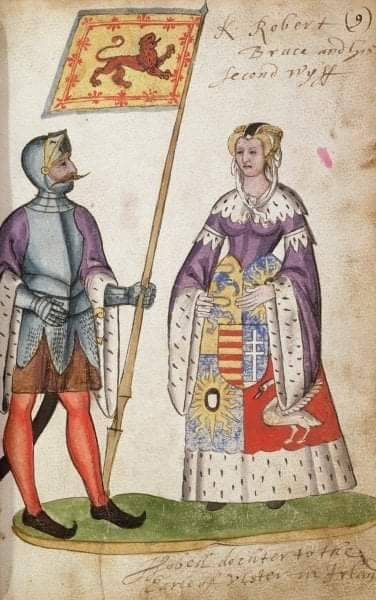
On October 26th 1327 Elizabeth de Burgh, Queen Consort of Robert the Bruce died at Cullen Castle, Banffshire.
Note sources disagree and some say October 27th.
In 1302 Elizabeth de Burgh married Robert Bruce, Earl of Carrick, at Writtle, near Chelmsford in Essex. Bruce was a widower with a young daughter. He had first married Isabella of Mar who died, in 1296, a short time after giving birth to a daughter, Marjory Bruce. Elizabeth's father was one of the most powerful Irish nobles of the period, Richard Óg de Burgh, 2nd Earl of Ulster.
When The Bruce first stood up to English rule he was beset by defeat and he sent Elisabeth, Marjory, his sisters Christina and Mary Bruce, and Countess Isobel to Kildrummy Castle in the north, where his brother Neil was to protect them. Unfortunately the castle was laid to siege, the Royal women escaped but were captured not long after at the sanctuary of St Duthac at Tain in Easter Ross where William II, Earl of Ross violate the sanctity, later handing them over to the English. He seems to have been forgiven by The Bruce for this as his name appears on The Declaration of Arbroath in 1320, perhaps showing a merciful nature to King Robert.
Isobel was held captive in an iron cage at Berwick Castle. Robert’s younger sister, Mary Bruce, was locked into an iron cage at Roxburgh Castle. She was just 24 years old. Mary spent the next four years caged and humiliated. Her older sister Christian Bruce was shown more compassion and was imprisoned in a Gilbertine nunnery in Lincolnshire. Christian’s husband, Sir Christopher Seton, was hanged, drawn and beheaded at Dumfries.
Elizabeth was held prisoner in England. It is thought that she was better treated because her father Richard de Burgh, Earl of Ulster, was a close friend of King Edward I. Elizabeth spent the next eight years in captivity in Burstwick, Bisham Manor, Windsor Castle, Shaftesbury Abbey, Barking Abbey and Rochester Castle.
Marjory Bruce, Robert’s daughter, was only 12 years old when she was captured at Tain. At first King Edward decided that she would be locked into an iron cage and hung for all to see from the walls of the Tower of London. Edward relented and Marjory was held in a Gilbertine nunnery in Yorkshire.
After the Battle of Bannockburn the Bruce was able to trade English nobles for his family. Mary Bruce went on to be twice married and had a son, Iain. Christian Bruce married Sir Andrew Murray who later became guardian of Scotland. Christian later led the defence of the besieged Kildrummy Castle at 62 years old and lived to 84.
Elizabeth de Burgh and Robert the Bruce were reunited and went on to have four children - Matilda, Margaret, John and David, who would become David II, King of Scots. Elizabeth died on this day 1327 and was buried in Dunfermline Abbey.
17 notes
·
View notes
Text
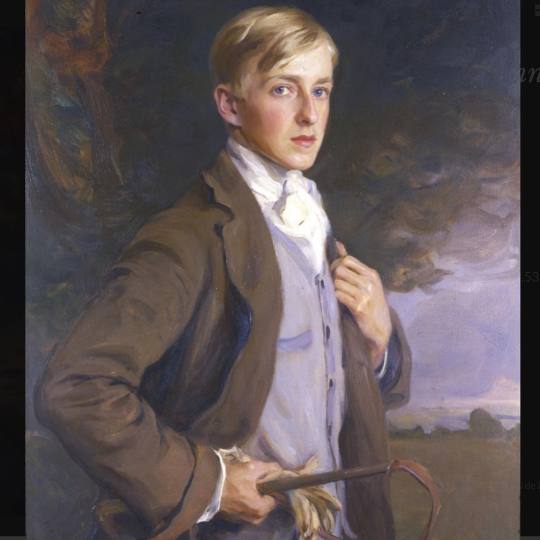
Robert Wynn-Carington, Viscount Wendover by Philip de Laszlo 1911
Style note: out of the darkness into some colour
“Albert Edward Samuel Charles Robert Carington, known as Robert, was born on 24 April 1895, at 50 Grovesnor Street in London. He was the sixth child and only son of Charles Carington, then Baron Carrington, and his wife the Hon. Cecilia Margaret Harbord. A close friend of Robert’s father, the Prince of Wales, was his sponsor at his christening on 5 June 1895 at Wycombe Parish Church. On 16 July that year, Charles Carington was created 1st Earl Carrington, and Robert Viscount Wendover. He retained this title even after his father was created Marquess of Lincolnshire in 1912.
Wendover attended Eton College from 1908 until 1912. Following in his father’s footsteps, he joined the Royal Horse Guards and gained the rank of Lieutenant. It was as a subaltern, in the Charge of the Blues 10th Hussars and Essex Yeomanry, that he died from wounds received in action near Ypres on 13 May 1915. He died in hospital in Boulogne on 19 May, his parents at his bedside. On 27 May a Greek verse, In Memoriam, was published in The Eton College Chronicle. His parents repatriated his body for the funeral, which took place at Moulsoe, Buckinghamshire, with full military honours. He was buried in St Mary’s Churchyard, Moulsoe.
This portrait was painted in September 1911 in the dining room at Daws Hill, the Carringtons’ family home on the Wycombe Abbey Estate in Buckinghamshire. De László had painted the sitter’s sister Myee, Viscountess Bury, in July that year, which may have been a catalyst for this commission.
10 notes
·
View notes
Note
If I'm an English peasant during the Wars of the Roses, do I know that the Yorks and Lancasters are fighting (before they pillage my farm) and why?
Surprisingly, yes!
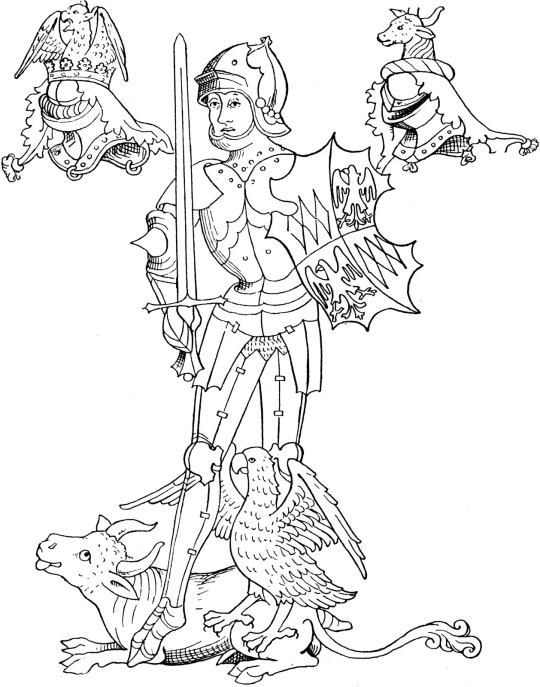
The lower classes were actually mobilized a fair bit during the political and military struggles between York and Lancaster:
the Kingmaker's popularity with the City of London due to his (frankly criminal) actions as the Captain of Calais had major political and military implications. It led to Suffolk's death in 1450, it prevented Margaret from holding pro-Lancastrian Parliaments in London, and when the real fighting started, Margaret had significant trouble controlling the capital.
Similarly, one of Edward IV's main political strengths was his enormous popularity among the commons of London, which allowed him to easily proclaim himself as King after Mortimer's Cross, and then again in returning from exile.
Jack Cade's rebellion in 1450 was a clear Yorkist/anti-Lancastrian effort to the point where it probably had some Yorkist backing behind the scenes.
The Kingmaker was really good at organizing peasant rebellions against his enemies: Robin of Redesdale's (also known as "Robin Mend-all") Rebellion of 1469 was a rebellion against Edward IV that used the imagery of Robin Hood to stir people up against taxes and "abuses of power," but was led by retainers of Richard Neville, and the Lincolnshire Rebellion of 1470 was sponsored by the Kingmaker and George of Clarence against Edward IV.
On the other hand, Robin of Holderness' rebellion in 1469 was a pro-Lancastrian rebellion against a "corn tax" (i.e, a tax on grain) and in favor of restoring the Percy family (one of the most powerful Lancastrian Houses and mortal enemies of the Nevilles) to the Earldom of Northumberland.
Finally, you have the Cornish Rebellions of 1497, which combined economic motivations (Henry VII has raised taxes for a war against Scotland, and had damaged Cornwall's economy by banning tin-mining) with support for Perkin Warbeck, the impostor Richard of York who tried to overthrow Henry Tudor.
So yeah, English peasants had Views on the Wars of the Roses, often depending on whether they came from the North or the South.
37 notes
·
View notes
Text
Get to know me - tag game!
Thanks for the tag @sydneyinacoma 💜
1. Were you named after anyone?
Yes, a family friend
2. When was the last time you cried?
Yesterday
3. Do you have kids?
x2 daughters 15 & 16
4. What sports do you play/have you played?
I played Hockey in school & skateboarding until a couple of years ago 😔 I miss it, but I had my shoulder fixed and I can’t risk fucking it up at my age
5. Do you use sarcasm?
Like it’s the air that I breathe
6. What is the first thing you notice about people
There eyes
7. What is your eye color?
Green 💚
8. Scary movies or happy endings?
Scary all the way
9. Any talents?
I can still do the full splits; not bad for 52
10. Where were you born?
Lincolnshire UK
11. What are your hobbies?
Reading, making TikTok edits and sewing
12. Pets?
No…and yes. A cat called Biggie Smalls. He’s not ours, but he spends most of his time here and we take care of him when his real owner is on holiday
13. How tall are you?
5ft 4 1/2 (yes, the half makes a difference)
14. Favorite subject in school?
History
15. Dream job?
Antarctic researcher
No pressure tag: @suzdin @mysterious-moonstruck-musings @pascalssbabyy @davnittbraes
Here’s Biggie Smalls snoozing right now
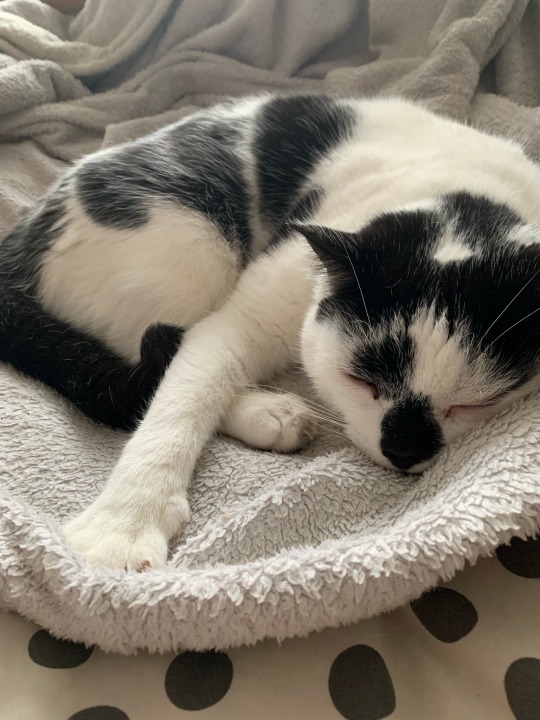
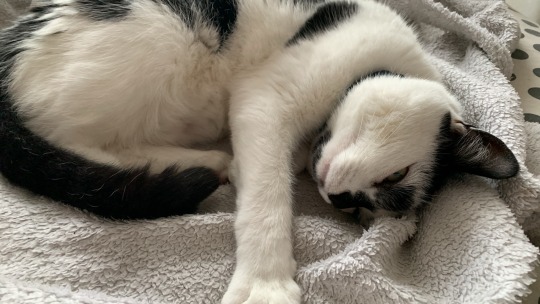
8 notes
·
View notes